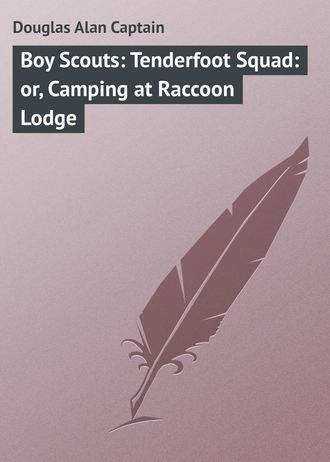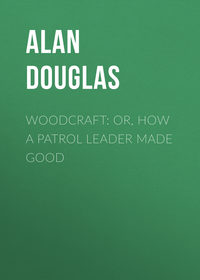 полная версия
полная версияBoy Scouts: Tenderfoot Squad: or, Camping at Raccoon Lodge
Then again the boy had taken that accusation on the part of the poacher quite to heart. It could be easily seen that he had a great affection for his father, even though it was his fond mother who had always given in to his whims, and come near utterly spoiling Rufus by her favors.
"It galls him to have heard any one accuse his father of being a trickster," was what Elmer told himself, as he noticed the soberness of Rufus, while the others in the circle about the fire chattered away, and seemed to be enjoying themselves hugely.
He had not changed his own plans a particle on account of hearing about the visit paid to the camp by Jem Shock. If anything, his resolution was stronger than ever to see more of Conrad, and perhaps meet his mother.
All of them were pretty tired, and, of course, as the tenderfoot pair had secured so little sleep on the first night, it was likely they would soon be "dead to the world" after letting their heads fall on their crude pillows. These were made out of a slip filled with sweet hemlock browse stripped by hand fresh from the tree, and fragrant as could be, with the incense of the woods. This bosky odor in itself is said to be conducive to sound slumber; at least all who spend their vacations close to Nature's heart so affirm, and they should know.
The night passed without any sort of alarm. Indeed, Alec and Rufus, once they got to sleep, knew next to nothing up to the time Lil Artha aroused them by beating on his frying-pan gong, as "the first call to breakfast."
They were glad to see that again the weather favored them, since there were all the signs of a pleasant day ahead. Elmer, however, warned the new recruits not to be too optimistic, because after the warmth of the last few days, it was likely that some sort of storm might develop.
It was arranged that George should change places with Lil Artha on this day, and accompany the two surveyors as a guard. The tall scout insisted on his carrying the gun along with him.
"Of course you won't need it to shoot any deer you happen to scare up, George," the owner went on to tell him, "but, as we saw yesterday, there may crop up conditions that make the having of a shooting-iron mighty handy. You may not need a gun at all, but if you do you want it right there."
Lil Artha possibly had something in mind which he wanted to do while left behind. He kept his own counsel, however, and Elmer, knowing that the tall scout was to be thoroughly trusted, did not ask questions.
So along about nine in the morning, when he thought it likely he would be apt to find Conrad seated in his favorite nook and playing some of his dreamy airs, all of them creations of his own brain, Elmer started forth. Lil Artha of course could easily surmise from the direction he took that he meant to look the boy up again, but immersed in his own affairs, he said nothing, only waved a cheery goodbye after the other.
So Elmer strode along, and this time he paid a little less attention to the many interesting things that cropped up on this side or that, for his thoughts were mostly concerned with Conrad, and his quaint thrilling music, which he yearned to hear again.
CHAPTER X
A CABIN IN THE CLEARING
As the scout-master found himself drawing near the spot where he had had his former interesting meeting with little Conrad, he listened with eagerness to catch the first faint notes from the quavering strings of the wonderful violin that had once been in the possession of Ovid Anderson.
"I'm no judge of such instruments myself," Elmer had told his chums when speaking of the matter, "but I expect that violin must be a valuable piece of polished wood. It certainly had an extra sweet singing tone to me, and seemed to just talk as the boy drew his bow over the strings. I wouldn't be surprised now if it turned out to be a Stradivarius or a Cremona, which I understand represent the finest makes of violins known to the profession."
When George seemed inclined to scoff at the idea, since such an instrument was likely to be worth thousands of dollars, and would have been sold long ago to get common necessities, Elmer had also told him that perhaps the daughter of the famous player would have parted with her soul before allowing that remembrance of her father leave her house.
Then Elmer caught the first faint sound of music. It thrilled him as he continued to hurry forward, and the sounds became stronger. Yes, and sure enough, there was lacking now some of that sadness he had detected in the playing of Conrad on the preceding day. Doubtless hope filled the aspiring heart of the lad. His talk with his mother may have given him new zeal, and the rainbow of promise was arching his heaven even then as he played, and waited for his new friend to appear.
"That sounds more like it," Elmer told himself, "and shows what a creature of circumstances a genius must always be. Even this child makes the music he finds in his own soul. But it's sweeter by far than what he played yesterday, for there is the breath of hope and promise in every note."
He soon came in sight of the familiar stump, and found the lad curled up there as before, with his violin tucked under his chin; just as though he might be to the manner born, while his deft right hand wielded the bow so tenderly that the daintiest sort of sound came forth at his command.
But he was watching at the same time, and no sooner did Elmer appear than the playing abruptly ceased, while the boy came running to meet him. Elmer then felt sorry that he had not remained in concealment a while longer, so that he might have enjoyed more of that crude but appealing music.
"Oh! I'm glad to see you again, Elmer!" exclaimed the boy, as he held out his hand, which the other did not attempt to squeeze too roughly, for he remembered that those little digits had to retain their sensitiveness to a remarkable degree in order to coax persuasive notes to come forth.
"But before we do any talking," said Elmer, "you must let me hear you play again. I notice that you are in a more joyous mood today, for it shows in your music. Please sit on your stump again, Conrad, and humor me for a while. Afterwards we can have a nice long chat; and I'm meaning to ask a great favor of you later."
The boy's eyes flashed with genuine pleasure. It was evidently a treat for him to have an audience besides the squirrels and rabbits, with perhaps a curious old red fox that, prowling around in search of a dinner, may have stopped to investigate the origin of those queer squeaks and twirls, and those sobbing notes, so like a hen partridge clucking to her brood.
For possibly ten minutes or so he played with scarcely any intermission. Elmer thought he could never tire of drinking in the sweet combinations of sounds which that deft little hand tempted from the five strings of the violin. It seemed as though the spirit of the old virtuoso must haunt the sacred instrument, and give forth some of his choicest chords through the medium of his descendant, heir to his undoubted genius.
And it also seemed as though the lad's power to delineate the sounds that appealed to him from the woods and waters was unlimited, for he seldom repeated as he went on, making up astonishing strain after strain.
Elmer was more than satisfied now his first impression had not been wrong. He felt doubly convinced that all this lad needed to develop into one of the greatest players the world had ever known was the directing hand of a master, who could guide him past the rocks on which his young talent might be wrecked if not taken in time.
"Now, that is enough for today," said Conrad, suddenly allowing his hand holding the bow to drop; "I never try to play when something inside tells me to stop. And I'm eager to tell you something good. My mother wants to meet you, Elmer."
This intelligence caused the scout-master to smile with pleasure.
"Why," he exclaimed eagerly, "do you know, that was the favor I meant when I said I wanted to ask you something. I have been wishing I could meet the mother of my new little friend; for I am sure she must be a remarkable woman."
"So she is," stoutly asserted Conrad, faithful little soul; "and the best mother there ever could be. All I know she has taught me, for, you see, she used to be a school teacher once, after grandfather died, and the money was lost."
"You told her about me, then?" asked Elmer.
"Why, of course; I tell her everything that happens to me!" Conrad declared, simply. "I couldn't have a secret from my mother, could I? And you ought to have seen how her eyes sparkled when she heard what you said about seeing I had a chance to learn the many things I ought to know about using a violin properly. Why, Elmer, I guess it must have been the wish of her heart, that some one would come along and say that; because she took me in her arms and hugged me, yes, and she cried some, too, I know she did, for I felt hot tears on my cheek; but then it must have been because she was so happy, for she laughed ever so hard right afterwards."
Elmer himself was deeply affected. He could picture that loving mother, possessed of the knowledge that the fires of genius burned in the soul of her child, and each night praying that in due time the opportunity might come for that to be developed into a glorious flame; and how overcome she might be on realizing that the one great wish of her whole life seemed about to be realized.
They talked on for quite a long while. Conrad with a child's natural curiosity asked many questions about the outside world, of which he had seen so little of recent years, since his father seemed to want to get away from all mankind. Elmer told him many things that excited his interest. Then finally he mentioned the fact that time was passing, and before a great while he would have to think of returning to his chums at the camp.
"I'd like very much to meet your good mother before I go back, Conrad," he suggested, at which the lad seized his hand and began to lead him off.
"So you shall," he remarked, briskly, "and I know she's waiting for me to fetch you over, because she told me to be sure and do so. You'll like my mother, Elmer, I know you will."
Elmer could understand why a mother should be anxious to meet one who had made such a vast promise to her boy, and which might mean so much in shaping his destiny.
"She wants to size me up," he told himself, with a satisfied smile, as he walked along at the side of the chattering boy; "she wants to see if I look like a vain boaster, or one she could trust. Well, I hope I don't disappoint her, that's all."
Any one who knew Elmer Chenowith well could have assured that anxious mother she could place the most implicit trust in a boy built after his type; his word was as good as his bond any day in his home town; and that is where they know a boy best of all.
Pretty soon they sighted a cabin through the trees. Smoke was coming from the chimney, made of slabs, and hard mud that had gained the consistency of cement by the drying process. Elmer smiled when he saw that it was of the same blue consistency as the thin column that had caught his attention on the preceding morning, and caused him to stroll that way later on. Yes, and he could catch the incense of burning hickory, than which there cannot be anything more delicious in the nostrils of a real fire-worshipper such as Elmer.
Their coming must have been noticed, for quickly a form appeared in the open doorway. It was that of a small woman, evidently Conrad's mother, for the boy quickly waved his violin toward her, and called out joyously:
"Here he is, mother; I've brought Elmer home with me to meet you, just as I promised I would!"
She greeted the scout warmly, and asked him inside where it was cool, out of the sun. Elmer felt rather than saw her eyes fixed eagerly on his face. Apparently Conrad's mother must have been more than satisfied with what she saw there, for she looked very contented, and even happy.
They were soon chatting as though the best of friends. Elmer told her about his home, and how he felt positive there were several well-to-do people in the town, lovers of good music, who would, if only they could hear Conrad play, be delighted to make up a generous purse and see that the grandson of so famous a man as Ovid Anderson was placed under the proper teacher in New York.
He also told about the father of one of his comrades having sent a girl abroad to have her voice cultivated, and how after she came to sing in opera, and turned out to be a great star, she had insisted on returning every cent he had expended on her, so that he might pass it along to some other poor girl or boy who had the gift of music, without the opportunity to accomplish results through lack of means.
Elmer was too wise to mention that name of Snodgrass when telling this; he feared that it might be too much like flaunting a red flag before a bull; for if Mrs. Shock shared Jem's antipathy for the Snodgrass clan, she would likely decline to let Conrad profit by such generosity.
It was plain to be seen that what he said interested her greatly. She told him more or less of her hopes and fears concerning the prodigy over whose future such clouds of uncertainty hung. Elmer sympathized with her, too, and quite won her heart by his manner; but then that was not an unusual thing with the scout leader, who by Nature had been gifted with a winning way that gained him hosts of loyal friends.
A little to the boy's surprise, too, she even ventured to speak of herself. Naturally she must have guessed that his curiosity would be aroused on finding the daughter of a famous man mated with one whom people deigned to look down on, and even shun, though, for that matter, Jem Shock wanted none of their society.
"They do not know him as Conrad and I do," she went on, hastily, after introducing the subject of her own accord. "I first met him away up in the mountains. After my father died, and the property was taken from me through an error in his will, I taught school for some years to gain a living. Then, one fall when I was in the Adirondacks, it chanced that a dreadful forest fire swept down from every side. I was caught in the midst of it, and I had given up all hope of surviving; when he came and took me up in his arms. Somehow I seemed to feel that all would be well. Oh! how strong he was, and how he braved every sort of peril in order to carry me safely through. It was then and there that my heart went out to him. And afterwards we were married. He has always been the same to me, tender and kind; though latterly his life has been soured through the treachery of one whom he trusted."
She stopped there, sighed, and looked sad. Elmer would have liked very much to know how they came to be there near Raccoon Bluff, which, by a strange twist of Fate, had recently come into the possession of the very man against whom Jem Shock believed he had such a grievance. It was too delicate a subject, however, for him to attempt to handle; she must tell him, if at all, through her own volition, Elmer concluded.
But somehow it did him good to hear such fine things said of the rough Jem; for it coincided with his belief that one cannot always tell from the exterior what may be within the shell. If only now Rufus could discover that it had all been a grievous mistake, and that his father would give anything to make amends for the unfortunate past, how delightful things would be.
So Elmer, as he continued to talk with the little lady – for she was that in every sense, although her dress may have been of the cheapest material, and there was a painful lack of many comforts in her modest cabin home – came to know her as well as if he had met her long before. Glimpses of her life, her hopes and fears were constantly passing before his mental observation; and he was more than glad now that he had taken that notion to walk in the direction of the blue smoke wreaths eddying upward in the lazy morning air several miles distant.
Conrad had put his beloved violin carefully away. It could be seen that his whole heart was tied up in that precious instrument. Elmer, remembering the dispute he had had with unbelieving George, asked about the violin, and whether it was really the former possession of the lad's famous grandfather.
"Yes, that is true," she told him, sighing again. "He used it all of his last years of playing. It shared some of his most wonderful triumphs, and he loved it as the apple of his eye. It is a genuine Stradivarius instrument. I could have sold it for thousands of dollars, since it had once been his means of fascinating untold myriads of music lovers; but that would have killed me. It is all I have left to remember him by; and besides, something told me when Conrad came that he was destined to inherit the talent."
Just then Elmer saw the boy spring down from his seat close beside his mother. At the same time he heard the sound of a heavy footfall, and guessed what that meant. Jem Shock was coming home. How would he greet one of the boys from the camp where that son of the man he had such cause for hating held forth? Elmer stood up. If he felt the least tremor in the region of his heart, he certainly gave no sign of this, for his face was wreathed in one of his most genial smiles as he waited for the poacher to appear.
Then a form darkened the open doorway, and with a shout Conrad rushed forward, to be gathered up in the arms of Jem Shock, and held tight to his breast. And seeing this Elmer somehow could not doubt but that it was all bound to come out right in the end, no matter what clouds might drift across the sky meanwhile.
CHAPTER XI
WHEN THE STORM BROKE
When Jem Shock discovered that he and his wife and boy were not alone in the cabin his manner instantly changed. Elmer saw the heavy brow knit, as though in sudden suspicion. He remembered that this man distrusted all his fellows, and that he had even defied the majesty of the law with regard to shooting wild game out of season, as well as catching fish by methods called illegal.
His manner of life would make him scan with suspicious eyes any stranger who came to his isolated cabin home, and who might just as well as not be some clever game warden, bent on securing evidence that would convict him.
"This is Elmer, and he is the good friend who promised to see that I got a chance to play my violin the proper way," said Conrad, with a dignity that would well have become a grown man.
As he spoke, he took the young scout-master by the hand and led him a pace or two forward. Elmer tried to be most cordial. He wanted to win the good will of this man, for many reasons. First, there was Conrad, and his possible brilliant future, if his amazing genius could be placed under the fostering care of a master. Then there was Elmer's belief that Jem had been badly treated by the whims of Fortune, and possibly the greed of some man; he needed a friend if ever any one did.
So Elmer held out his hand as he advanced. He also smiled warmly, as if to chase away that look of distrust he could see gathering on Jem's strong face.
"We have met before, Jem, on the road, while our party was on the way up here," he went on to say in as cordial a tone as he could muster. "You remember I said then I hoped to see something more of you, and invited you to stop in and have a cup of coffee with us, in case you happened to be passing our camp. And now that I have made the acquaintance of Conrad and your good wife, I hope we can be friends, Jem."
The man still continued to frown. Under his heavy eyebrows he was looking keenly at the speaker. Elmer's manner was surely enough to disarm suspicion; and doubtless he would have quite won the man over then and there only for one thing. This was the presence of a boy in the party bearing that unfortunate name of Snodgrass; and which seemed to represent everything that was evil, in the estimation of the poacher.
So Jem did not make the first move to take the extended hand. If he had suspected the other to be ready to suddenly snap a pair of handcuffs on his wrists, he could not have held more aloof.
"I'm not making friends with anybody these days," he managed to mutter, "leastways when they are so thick with the son of the man who sold me out and left me high and dry on the bank."
"But the rest of us never heard of you before, Jem; and even Rufus says it must be some terrible mistake, because his father would never do such a mean trick, even if he is a real-estate operator. But, Jem, I want to be friends with you just because of Conrad here. It would be a burning shame if he didn't get his chance to prove that his grandfather's talent is running in his blood. I am sure that I'll be able to interest some really good people, all of them lovers of the best music, in Conrad; and that arrangements can be made to put him under the charge of a leading teacher, who will see that he has a chance to thrill the world, when he grows older."
The man's face lighted up for just a brief interval. Perhaps he had dreamed of some day seeing Conrad the centre of a madly applauding throng of well-dressed people, who would be ready to crown the lad as the greatest genius of the decade. Then the old doubts returned again, and he scowled darkly.
"We may be poor," he said bitterly, "which isn't my fault, but my misfortune; yet we're not paupers; and even to see my boy snatch the prize he deserves I wouldn't beg money from any living man or woman. I'll die before I accept charity. If I had my just dues there would be plenty of money to fix Conrad out; as it is he must wait, and take his chance."
"But, Jem, this wouldn't be charity," Elmer insisted, earnestly. "It could be done on strictly business principles, a bargain being made in black and white, so that a record of the expense might be kept; and after Conrad began to earn big money, he could gradually return the loan to those kind friends who had been so deeply interested in his fortunes. Don't shut him out from his only chance, Jem, just because one man may have injured you. There are other kinds of people in this world, kind-hearted people who are always looking for an opportunity to help struggling genius. Oh! please don't decide in a hurry. Think it over, talk it over with your wife here before you turn the offer down; because it is given in good faith, Jem."
Mrs. Shock listened, and her eyes grew moist. She apparently did not think it wise to interfere while a stranger was present, but Elmer believed her influence was bound to be thrown in favor of the proposition. Therefore he did not quite despair, though the poacher continued to shake his head, and keep his teeth firmly clenched, after the manner of a stubborn man who has made up his mind, and against whom all power cannot prevail.
You see, Elmer, young though he may have been, was somewhat of a philosopher. He knew that gentle influence may sometimes accomplish much more than the most sturdy strength. He had never forgotten the moral of that old story about the traveler who was trudging along a country road, when the two rival elements, the Sun and the Wind, entered into a heated argument as to which might be the more powerful, and determined to test their assertions upon the devoted head of the pilgrim. So the wind blew harder and harder, but only had the effect of making the traveler draw his cloak tighter about him. Then the sun has his turn, and began to warm up to his task, until the almost baked man was glad to throw off his cloak, which result gave the victory to the heavenly orb.
And so perhaps the gentle but persuasive influence of Conrad's mother might in the end prevail against the wild gusts of the man's anger. Elmer at least would continue to hug that hope to his heart.
He saw that his continued presence would do no further good. It were perhaps better that he took himself off, and allowed the seed he had sown to germinate. Time can often work wonders, and the look Mrs. Shock gave him somehow further aroused his confidence that all might yet be well.
So he said he would be going, and the last he saw of them Conrad was waving his hand in farewell, while his mother nodded her head significantly. As for Jem, he continued to stand there looking glum, as though a riot of thoughts might be holding high carnival in his brain, the old suspicion and hatred for mankind engaged in a desperate conflict with newly awakened hopes.
Elmer made his way back to camp, and arrived long before noon came, so that he had plenty of time to rest and think over the situation. He wondered whether he had succeeded in making any progress by his morning's expedition. He had met Jem, for one thing, and told him how much he was interested in Conrad's playing. Yes, Elmer concluded that the game he meant to play had been advanced more or less since the coming of another day.







